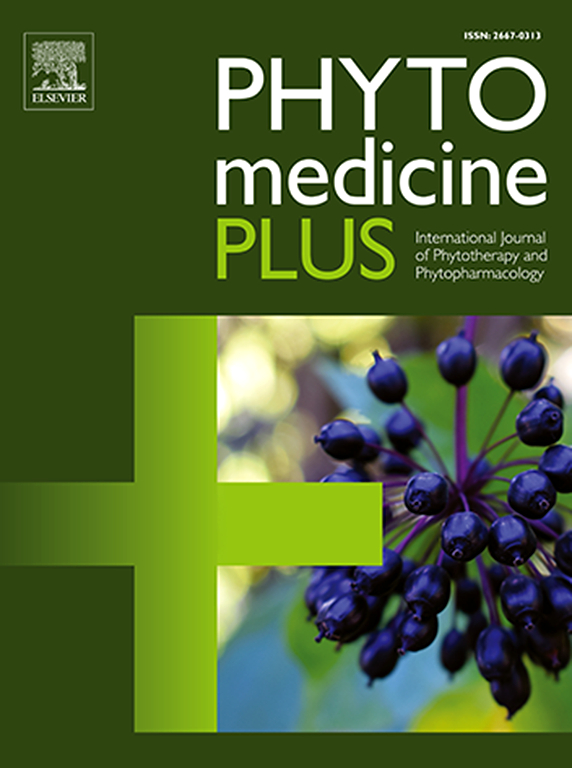Scopoletin as a cardioprotective agent against cisplatin-induced oxidative stress and inflammation
Q3 Pharmacology, Toxicology and Pharmaceutics
引用次数: 0
Abstract
Background
Cisplatin (CP) is a chemotherapeutic agent notorious for its cardiotoxic effects. Scopoletin, a natural coumarin, has shown potential due to its antioxidant, anti-inflammatory, and anti-apoptotic properties, which may counteract CP-induced cardiotoxicity.
Purpose
The study aimed to explore the cardioprotective effects of scopoletin against CP-induced damage in mice, focusing on histopathological changes, cardiac biomarkers, oxidative stress, inflammation, apoptosis, and the modulation of key signaling pathways.
Study Design
A controlled experimental design was employed to evaluate scopoletin's efficacy in alleviating CP-induced cardiotoxicity, with dosing variations to assess dose dependency.
Methods
Male mice were allocated into five groups: a control group, a cisplatin-only group, two groups treated with low (50 mg/kg/day) and high doses (150 mg/kg/day) of scopoletin in conjunction with cisplatin, and a scopoletin-only group. The interventions were administered over a period of one week, with cardiac damage assessed through histopathological examinations, serum cardiac biomarker measurements, and analyses of oxidative stress, inflammatory cytokines, and apoptosis-related proteins. The efficacy of scopoletin in modulating the p62/Keap1/Nrf2 pathway was also examined.
Results
Histopathological assessments showed less tissue damage in scopoletin-treated groups (p < 0.01). Cardiac biomarkers were significantly lower in l- and H-scopoletin groups compared to the CP-only group (p < 0.05, p < 0.01). Scopoletin effectively reduced ROS and MDA levels while enhancing antioxidant enzymes like SOD, CAT, and GSH (p < 0.01). With scopoletin treatment, inflammatory cytokines TNF-α and IL-6 were notably reduced (p < 0.01). Apoptosis analysis revealed lower levels of pro-apoptotic proteins and higher levels of Bcl-2 in scopoletin groups (p < 0.05, p < 0.01). Significantly, scopoletin restored the function of the p62/Keap1/Nrf2 signaling pathway (p < 0.01).
Conclusion
The findings suggest scopoletin's potential as an adjunctive therapy in cancer treatment to mitigate CP's adverse effects, warranting further clinical investigation.

东莨菪碱作为抗顺铂诱导的氧化应激和炎症的心脏保护剂
背景:顺铂(CP)是一种因其心脏毒性作用而臭名昭著的化疗药物。东莨菪素是一种天然香豆素,由于其抗氧化、抗炎和抗细胞凋亡的特性,可能会抵消cp诱导的心脏毒性。目的探讨东莨菪碱对cp诱导的小鼠心脏损伤的保护作用,主要从组织病理学改变、心脏生物标志物、氧化应激、炎症、凋亡以及关键信号通路的调节等方面进行研究。研究设计采用对照实验设计评估东莨菪碱减轻cp诱导的心脏毒性的疗效,并采用剂量变化来评估剂量依赖性。方法将小白鼠分为5组:对照组、单顺铂组、低剂量(50 mg/kg/d)、高剂量(150 mg/kg/d)东莨菪碱联合顺铂组和单剂量东莨菪碱组。干预为期一周,通过组织病理学检查、血清心脏生物标志物测量、氧化应激、炎症细胞因子和凋亡相关蛋白分析来评估心脏损伤。我们还研究了东莨菪素调节p62/Keap1/Nrf2通路的功效。结果组织病理学检查显示东莨菪碱治疗组大鼠组织损伤较小(p <;0.01)。与仅cp组相比,l-和h -东莨菪素组的心脏生物标志物显著降低(p <;0.05, p <;0.01)。东莨菪素能有效降低ROS和MDA水平,同时提高SOD、CAT和GSH等抗氧化酶水平(p <;0.01)。东莨菪素治疗后,炎性细胞因子TNF-α和IL-6显著降低(p <;0.01)。凋亡分析显示,东莨菪素组的促凋亡蛋白水平较低,Bcl-2水平较高(p <;0.05, p <;0.01)。值得注意的是,东莨菪素恢复了p62/Keap1/Nrf2信号通路的功能(p <;0.01)。结论东莨菪碱有可能作为肿瘤治疗的辅助药物,减轻CP的不良反应,值得进一步的临床研究。
本文章由计算机程序翻译,如有差异,请以英文原文为准。
求助全文
约1分钟内获得全文
求助全文
来源期刊

Phytomedicine Plus
Medicine-Complementary and Alternative Medicine
CiteScore
3.70
自引率
0.00%
发文量
178
审稿时长
81 days
期刊介绍:
 求助内容:
求助内容: 应助结果提醒方式:
应助结果提醒方式:


